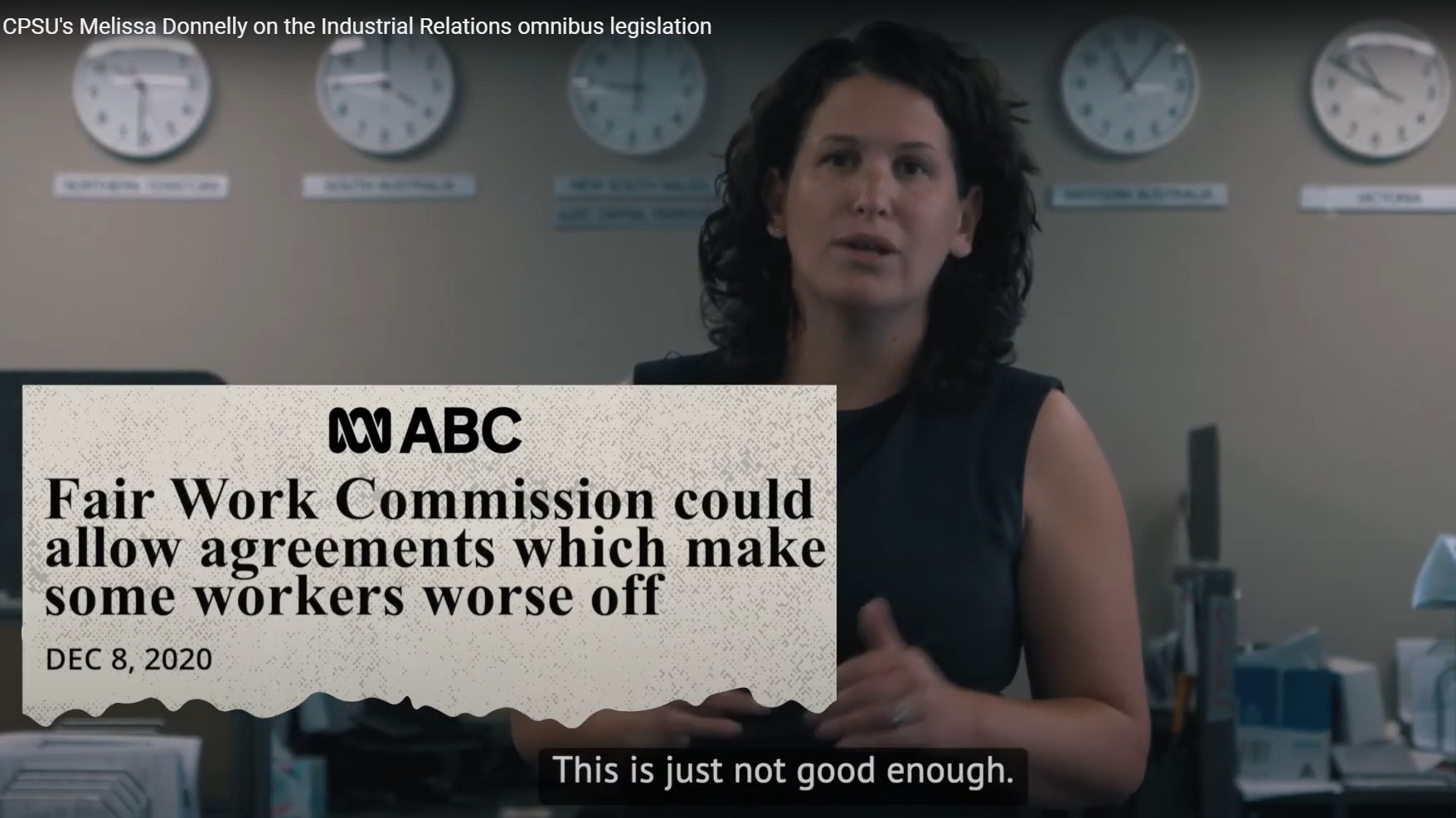
The Federal Government’s proposed changes to Australian workplace laws – commonly referred to as the Industrial Relations (IR) Omnibus Bill – look set to go to the upper house next month where Senate crossbenchers wield the balance of power.
Several of the Government’s amendments to the Fair Work Act have attracted significant criticism, particularly those relating to casual employment and insecure work.
While an inquiry into the proposed laws by the Education and Employment Legislation Committee is due to report early next month, there is growing speculation that the legislation will face a Senate vote as early as the week beginning 15 March.
“The test for the Government’s industrial relations legislation must be whether is leaves workers worse off and unfortunately on critical issues it does,” CPSU National Secretary Melissa Donnelly said.
“In the critical issue of insecure work, which fuelled so much of the second wave of this pandemic, the Government’s Bill fails this test.
“It fails to address the problem of insecure work which is so real across our country, including in the Federal public sector where we see thousands and thousands of casuals and increasing reliance on insecure labour-hire arrangements,” Ms Donnelly said.
The latest bid to overhaul Australia’s workplace laws began back in May 2020 with the announcement of government-convened roundtable, bringing together unions and business, to chart a ‘practical reform agenda.’
However, the Government’s consensus approach – styled as an appeal to national unity in the face of the pandemic – proved short-lived. Peak bodies representing corporate and business interests soon undermined the confidential negotiations and the roundtable experiment fizzled out within three months.
After ending consultation with the Australian Council of Trade Unions (ACTU), Attorney-General and Minister for Industrial Relations Christian Porter then developed the IR Omnibus Bill; introducing the proposed legislation into Parliament last December.
The Australian Union movement, including the CPSU, is campaigning against these proposed changes and speaking out for working people. Support the campaign here.
The large package of measures cover five areas: awards, greenfields agreements, casual employment, enterprise agreements and compliance and enforcement.
However, plans to include a two-year exemption from the application of the Better Off Overall Test (BOOT) to new enterprise agreements were dropped in mid-February after Senate crossbenchers refused to continue negotiations with the Government.
“While we continue to believe this was a sensible and proportionate proposal… we also understand that this measure had the potential to distract from other elements of the package which will help employers and employees recover from the economic impacts of the pandemic,” Minster Porter said.
ACTU Secretary Sally McManus was not impressed.
“The Government will try and pull the wool over the media and crossbench Senator’s eyes by removing one small aspect of their IR Omnibus changes and spin it that they have ‘fixed’ it.
“Removing the BOOT for two years is only one problem – there are permanent changes that hurt workers,” Ms McManus said.
Arguably the most controversial aspects of the legislation relate to casual employment and insecure work.
The proposals include; a statutory definition of casual employment (as determined by the employer), the retrospective removal of rights to entitlements (such as paid leave, public holiday rates and redundancy payments) for workers found not to be casuals, and provisions for the conversion of casual employment to an ongoing arrangement, that have been criticised as weak and unenforceable.
“The Government’s bill allows employers to sidestep casual conversion – the right for casuals to seek permanent employment – and relies on subjective tests (applied) by the employer to determine who is or who isn’t a casual. It fails to address the problem of insecure work in any real way,” Ms Donnelly said.
According to CPSU’s submission to the inquiry examining the legislation ‘insecure employment is all too common in the APS.’
‘There are many thousands of casual and labour-hire workers performing ongoing work for the Commonwealth, rostered on regular shifts, working full time equivalent hours, in some cases for years.
‘Currently 17% of the Australian Taxation Office workforce is casual, 16% of the Australian Public Service Commission, 15% of the Department of Finance, and 11% of Services Australia,’ the submission states.
With the inquiry into the legislation due to report early next month, there is speculation that the Government may push for a Senate vote in the week beginning 15 March, which would represent the last opportunity to secure passage of the new laws before the May budget.
However, while the disposition of the Senate crossbench remains largely hidden from public view, the Government may yet come under pressure to split the omnibus package into separate measures to facilitate negotiations.
The palatability of changes to workplace laws – always politically contentious and not without electoral risk – will also be tested by the conclusion of the JobKeeper payment, which is scheduled to end by the end of March.
